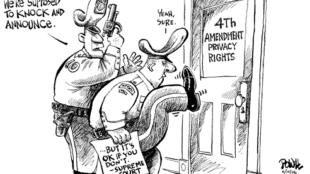The Constantly Shrinking Fourth Amendment
(Source) “Each man’s home is his castle.” This is the notion that the Fourth Amendment seeks to enforce. The Fourth Amendment guarantees protection to Americans against unreasonable searches and seizures in their own homes. Authorities cannot search a person’s home, papers, or effects without a warrant signed by a judge, upon probable cause and particularly describing the place to be searched and the persons or things to be seized. What this effectively means is that government officials cannot walk into one’s home, unwarranted, and do as they please in an attempt to find evidence of a crime. Naturally, then, the Fourth Amendment offers protection that is crucially important and guards the larger right to privacy that is fundamental to every human being. The right to privacy is not expressly mentioned in the Constitution, but is inferred through interpretation. One’s private property is hardly private if the police and other officials can walk in and search the premises without a warrant or one’s permission. Despite the evident significance of the Fourth Amendment right, judicial interpretations of the Fourth Amendment and its exceptions over the past few years have diluted the protection afforded by the Fourth Amendment. Such court holdings have created [read more]


